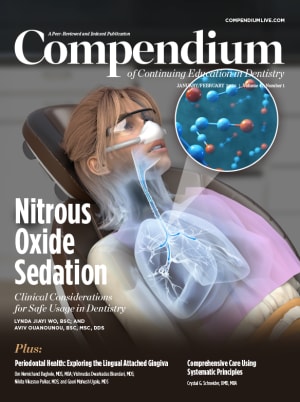Mark L. Cannon, DDS, MS
This pediatric patient presented with a dental history of severe and spontaneous pain due to the upper left primary molar that was sensitive to hot and cold foods, indicative of an irreversible pulpitis. The referring dentist had attempted to treat the patient but due to disruptive behavior (diagnosis of sensory processing disorder), the severe spontaneous pain, and pain to percussion the patient was referred for treatment by a pediatric dental specialist. Radiographs revealed an obvious carious exposure of the pulp, and the treatment plan formulated would likely include a pulpotomy therapy. After a lengthy discussion with the parent, the clinician proceeded with pulpal therapy and restoration of the tooth. One concern was that a normal-sized stainless-steel or zirconium crown would require substantial tooth preparation for full coverage, which would have been difficult for this apprehensive child to endure. An alternative, conservative treatment was to use TheraCal PT™ (BISCO, bisco.com) as the pulpal material and to restore the molar with a bulk-fill resin composite restorative. This approach was also beneficial in alleviating parental concern about stainless-steel crowns related to reported nickel reactivity. The parent had been instructed by their physician to not have metal restorations. Though full-coverage restorations historically have been placed following pulpal therapy mainly due to limitations of non-bonded silver amalgam materials, newer adhesives and restoratives have been highly successful functioning as final restorations.
Key Takeaways
Dual-cured, resin-modified calcium silicate-TheraCal PT is a biocompatible, calcium-releasing alkaline material for use in the pulp chamber that maintains tooth vitality, protects the dental pulpal complex, and is conducive to successful pulpal therapy for pediatric patients.
Resists breakdown and degradation-TheraCal PT has significant physical properties to reinforce a pulpally involved primary molar or anterior tooth, thus easing the requirement for full coverage of the treated dentition.
Conservative treatment-The use of a durable hydrophilic resin-modified tri-
or dicalcium silicate material such
as TheraCal PT allows for more conservative restorations.
About the Author
Mark L. Cannon, DDS, MS
Professor, Feinberg School of Medicine, Department of Otolaryngology, Division of Dentistry, Northwestern University, Evanston, Illinois; Private Practice, Long Grove, Illinois












